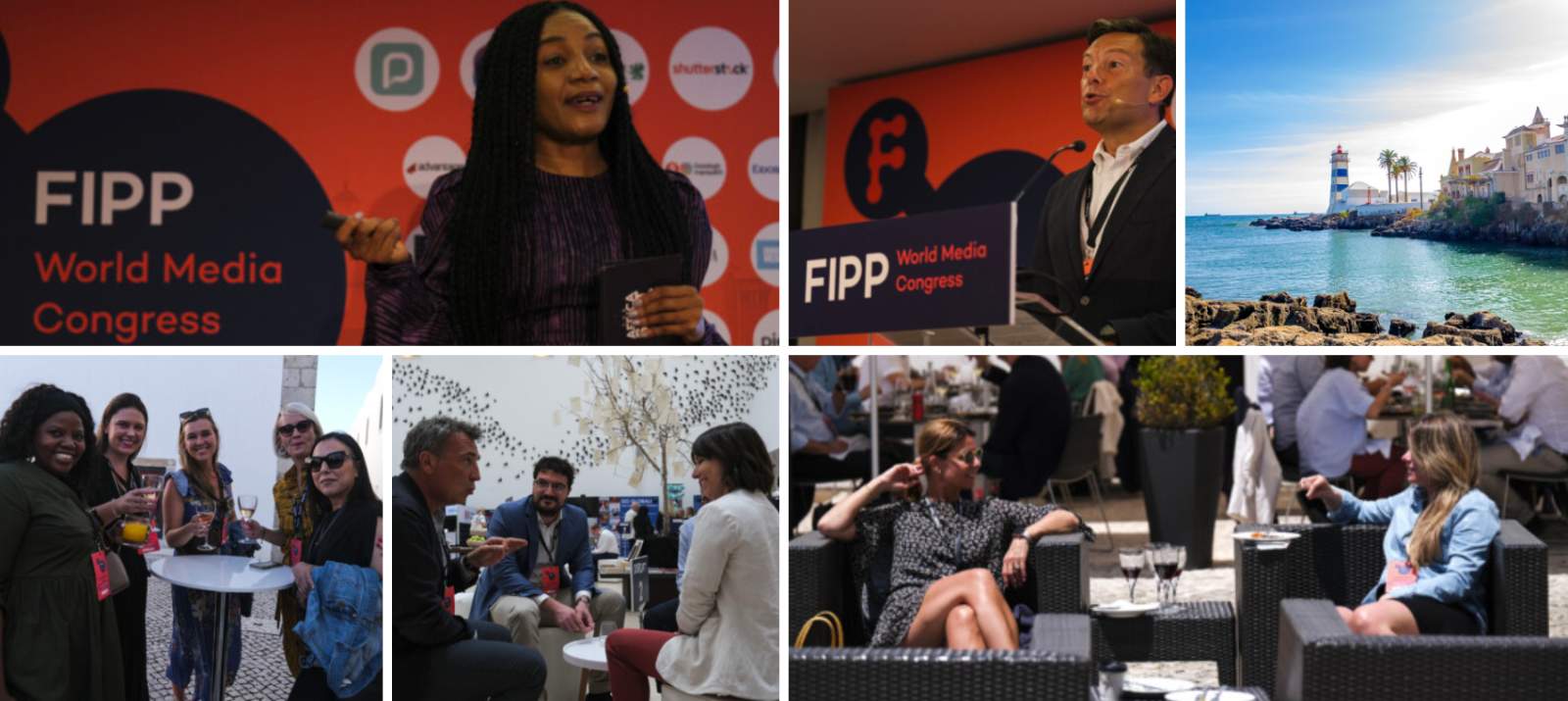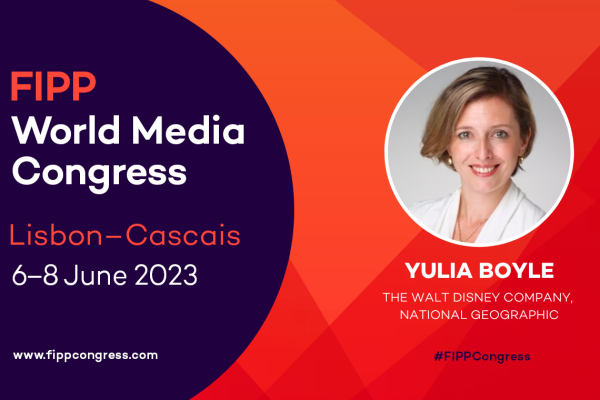Rapid-Round Congress Q&A: Yulia Petrossian Boyle, NatGeo, The Walt Disney Company
At FIPP Congress 2023, Yulia will be wearing two hats. As the VP at The Walt Disney Company (TWDC) with a focus on the National Geographic Media portfolio, she will be sharing NatGeo’s strategy to transform some of their international media partnerships. Transformation is directed towards strengthening NatGeo’s global content hub with the best-in-class travel, adventure, wildlife, natural history content sourced from their local language editions partners, to continue expanding NatGeo’s global audience and diversifying storytelling.
As the chair of FIPP Yulia will also deliver a keynote referencing how the organisation is playing a pivotal role in the ongoing transformation of the media.
Yulia says “I am thrilled we have this remarkable forum – FIPP Congress – where biggest content brands can come together under FIPP’s leadership to discuss, debate, and establish effective ways of using – and governing -the various new technologies now available for expanding the canvass of our storytelling.”
In this interview Yulia talks about:
- The challenges of AI-created content, but also how it might deliver opportunities for media companies to double down on what they do best
- The potential of the Metaverse for developing new ways of storytelling
- Why media companies need to prioritise investment in authentic storytelling, fact-checking, and journalistic ethics
At FIPP World Media Congress in Cascais, Portugal, on 6-8 June, Yulia will deliver a keynote addressing some of the many key issues that high-quality content producers are currently contending with
For specially discounted tickets click here.
Here she responds to our rapid-round questions.
Who are you? And what is your role in the media/publishing?
I am a Vice President at The Walt Disney Company (TWDC) leading the strategy across International Media Partnerships, Visual Asset Management, and Content Operations for the National Geographic Media portfolio. I oversee the strategy and P&L for NG international media in 50 countries in 27 languages, as well as work in the transformation of our digital visual archive from legacy systems to state-of-the art technology to enable global storytelling. I have been with NatGeo for 16 years working on expanding our brand’s global reach in local languages across formats and platforms. I am very excited that as a part of TWDC I also get to collaborate closely with multi-disciplinary Disney teams on synergy projects with NatGeo, integrating NatGeo’s authentic content and sustainability ethos across products and experiences.
What have been the highlights of your career in media/publishing so far?
I have been an early advocate at NatGeo – since 2008! – for reverse-licensing of original international content to enrich US-based publishing media. My firm conviction has always been that featuring unique content created by our local on-location creators will lead to an increase in our global audience and substantially enhance storytelling by incorporating diverse perspectives and voices from the local community. Furthermore, it will contribute to promoting diversity, equity, and inclusion in storytelling.
One of the early projects I kicked-off, led and executed at NatGeo was introducing NG History magazine to the US market. NG History is a sub-brand created by our publishing partner RBA in Spain, and Spain’s #3 largest subscription magazine (# 1 being the NG Magazine!). This unique product, which continues its success in the US, Spain and four other markets, has not only expanded our magazines’ portfolio reaching a super-passionate segment of highly engaged history buffs, but also dispelled the stereotype that great content can only originate from the US. Together with my team, I have continued this strategy ever since to increase internationally developed authentic local content for NatGeo.
What do you see as the three key trends in the media?
- Artificial Intelligence: AI proliferation is a tremendous shift in consumer technology, which is creating a lot of competition to search platforms and may even replace search as the main way consumers look for information on the internet. According to Sundar Pichai, Google CEO “The scale of the largest AI computations is doubling every six months, far outpacing Moore’s Law”. Those advances should be carefully tracked and analysed by publishers as they will have a lot of implications that may affect our current business models.
- Expanded canvas of storytelling: Publishers continue to push the industry forward, finding new ways to engage with audiences. The Metaverse – or whatever new iterations of the internet emerge – may offer us thrilling and lucrative opportunities to innovate. More and more people are spending time in virtual worlds – not only for gaming, but for immersive learning, attending virtual concerts and museums, embarking on adventures to places that are hard to access in real physical life. I am a strong believer that virtual worlds can increase access and inclusion for underrepresented and marginalised communities, by opening access to education, health, exploration, virtual therapy, etc. For example, we see some incredible examples of benefits the virtual worlds can bring: people with visual and hearing impairments getting audio and visual cues from virtual reality tools, med students in places lacking medical technology practicing surgeries through a real-world simulation in VR, and astronauts training for space missions. According to a 2021 report from Bain & Company, by 2030, people will be spending as much as 20 hours per week in the virtual worlds. And great trusted content is so needed for those spaces, which publishers can and should work on providing.
Making our storytelling more immersive is something that will help us keep audiences engaged with our brands. There are lots of different ways to consider engaging through virtual experiences – subscription-based services, loyalty programs, etc. - Trust and Authenticity: Credible, trustworthy, deeply researched storytelling is in more demand than ever given the proliferation of user-gen content, AI, etc. Publishers and media outlets have to prioritise investment in authentic storytelling, fact-checking, and journalistic ethics.
Why are these trends important and how will they change media/publishing?
The ongoing conversations about AI must be taken seriously by publishers not only because of serious ethical concerns, but also, because an important trend is emerging that may significantly affect the established dominant business models for publishers: advertising and premium digital content subscriptions.
Organic search traffic is a vital source of traffic and revenue for publishers. With the current race in conversational AI tools by Google, Microsoft and others, the organic traffic to publishers’ sites may continue to decrease, as the search engines’ algorithms try to keep users on their own platforms. Continued reduction of organic links is likely to cause a decline in traffic which could negatively impact advertising and subscription revenue. To counteract this there is an opportunity to continue diversifying our revenue sources, creating high-quality content that will be chosen by our trusted audiences over the AI-generated one.
Anything else you’d like to tell Congress delegates?
FIPP members, and Congress participants are powerhouses of industry knowledge, intelligence and journalistic integrity. You all have established the utmost trust and reliability with your audiences due to continued investment in independent, fair, uncompromising journalism and business ethics. I am excited that we have this incredible forum – FIPP Congress – where we all can come together under FIPP’s umbrella to discuss, debate, and establish effective ways of governance of the new technology that is available now for consumers. I hope we can work together as an industry – under the leadership of FIPP, to collectively develop standards and guidelines and lobby governments and big platforms to ensure all those new tools work within established ethical standards and augment rather than replace the consumer experience with our brands.
Explore Further
- Explore NatGeo here
- Follow Yulia on LinkedIn
- See more Congress speakers
About Congress

The FIPP World Media Congress is a must-attend event for anyone in leadership positions in the media. Delegates can hear from an incredible range of media thought leaders and influencers while networking with their peers in the resort’s stunning venues and hotels.
For specially discounted tickets click here.








